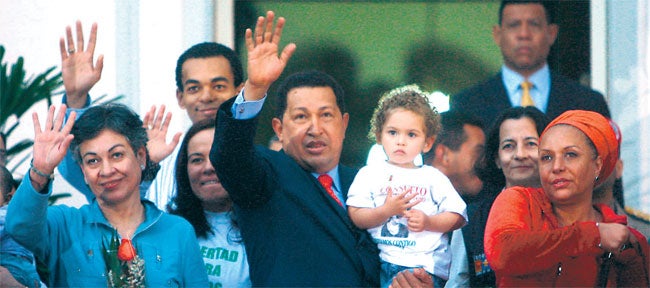Chavez claims success as two hostages freed by Farc rebels

Your support helps us to tell the story
From reproductive rights to climate change to Big Tech, The Independent is on the ground when the story is developing. Whether it's investigating the financials of Elon Musk's pro-Trump PAC or producing our latest documentary, 'The A Word', which shines a light on the American women fighting for reproductive rights, we know how important it is to parse out the facts from the messaging.
At such a critical moment in US history, we need reporters on the ground. Your donation allows us to keep sending journalists to speak to both sides of the story.
The Independent is trusted by Americans across the entire political spectrum. And unlike many other quality news outlets, we choose not to lock Americans out of our reporting and analysis with paywalls. We believe quality journalism should be available to everyone, paid for by those who can afford it.
Your support makes all the difference.Venezuela's populist President Hugo Chavez pulled off a propaganda coup yesterday when he secured the release of two high-profile Colombian hostages held in the jungle for years by the Farc rebel movement – the first significant hostage release in Colombia in almost seven years.
Two Venezuelan helicopters with Red Cross markings flew into a remote part of southern Colombia and picked up the two hostages – a former congresswoman, Consuelo Gonzales de Perdomo, and Clara Rojas, an aide to the one-time presidential candidate Ingrid Betancourt, who is herself being held prisoner by Farc.
They then flew out of the country and headed towards the Venezuelan capital, Caracas.
The rescue was the culmination of months of fraught negotiations involving Farc, Colombia's hardline President Alvaro Uribe, and his ideological rival Mr Chavez. On at least two occasions, the most recent at the end of last month, it appeared the negotiations had broken down.
Yesterday, though, a triumphant Mr Chavez wasted no time in trumpeting his achievement, saying he had spoken to the freed hostages moments after their rescue and reporting that they were in good condition. "Venezuela will continue opening the way for peace in Colombia," he said. "We are ready, and in contact with the Farc, and we hope the Colombian government understands. I'm sure they will understand." He said he told the two women: "Welcome to life, welcome to life."
Mr Chavez has made strenuous efforts to play the peacemaker in Colombia, where President Uribe's US-backed government and Farc have been embroiled in a seemingly intractable guerrilla war involving drugs, territory and political ideology.
He has been treated with a hefty dose of mistrust by President Uribe, never more so than in November when the Colombian leader accused Mr Chavez of making unauthorised contacts with the Colombian military and promptly scotched the original, much more ambitious, plan to free a total of 46 hostages – including Ms Betancourt and three US defence contractors – in exchange for 500 imprisoned Farc rebels.
Undaunted, Mr Chavez focused his attention on Ms Gonzales and Ms Rojo, as well as Ms Rojo's three-year-old son Emmanuel, fathered by one of her captors.
At the end of last month, Mr Chavez invited a large group of observers and journalists – among them Argentina's former president Nestor Kirchner and the film-maker Oliver Stone who was making a documentary on the hostages – to sit with the rescue helicopters at an air base in Colombia.
The helicopters never took off, however, and Farc blamed operations by the Colombian military for their decision not to reveal where the hostages could be picked up. And it transpired that Emmanuel was not in the jungle at all – he had been released a long time ago and was living in a foster home in Caracas. DNA tests proving his identity were released this week.
Still, Mr Chavez continued his efforts, although the Colombian government warned him he wouldn't be allowed to assemble such a prestigious group of observers again because it risked enhancing the credibility of Farc while casting the Uribe government in an unfavourable light.
The operation could not go ahead without Colombian government co-operation, because the rescue helicopters needed to be sure a ceasefire was in place before taking off.
Yesterday's operation apparently went off without a hitch. Ms Rojas' mother, Clara Gonzalez de Rojas, who travelled to Caracas last month in the hope of being reunited with her daughter, held back tears as she declared: "This is the biggest miracle my God could have ever given me. I'll be truly happy when I go with my daughter to retrieve my little grandson."
Ms Rojas was kidnapped along with Ms Betancourt in 2002 while they were campaigning against the Uribe government. Ms Betancourt remained symbolically on the ticket in the presidential elections that year, with Ms Rojas elevated to the equally symbolic position of her vice-presidential running mate. Consuelo Gonzales was kidnapped in 2001 near the city of Neiva. Farc holds hundreds of hostages as bargaining chips.
Free at last
September 2001
Former Congresswoman Consuelo Gonzalez is abducted by Farc guerrillas.
February 2002
Colombian presidential candidate Ingrid Betancourt and aide Clara Rojas are held.
August 2002
Alvaro Uribe becomes President of Colombia, pledges military action against Farc.
February 2003
Three Americans kidnapped after plane crashes in jungle.
2005
Rojas gives birth to a son, Emmanuel. The father is believed to be a captor. The boy is now in foster care.
August 2007
Venezuelan President Hugo Chavez offers services to mediate in hostage release.
November 2007
President Uribe ends Chavez's attempts, after Chavez contacts Colombian army chief.
31 December 2007
An international attempt to secure the release suspended, amid recriminations.
10 January 2008
President Chavez speaks to Gonzalez and Rojas by satellite phone. The women fly to the Venezuelan capital. Farc still holds 46 high-profile hostages, including Betancourt.
Join our commenting forum
Join thought-provoking conversations, follow other Independent readers and see their replies
Comments